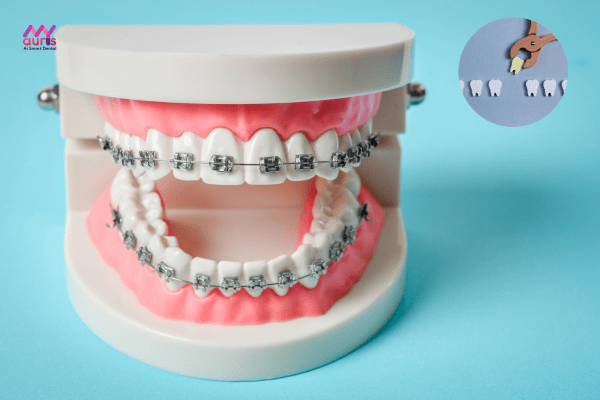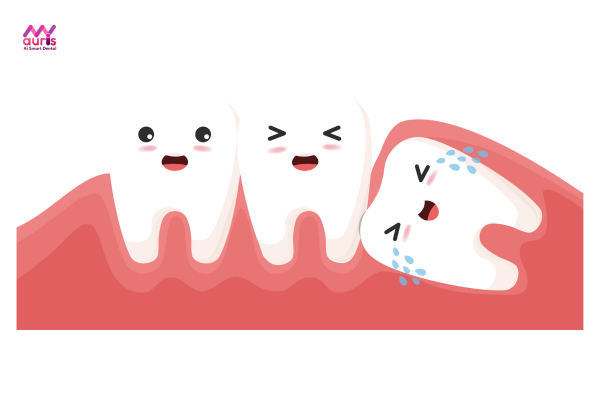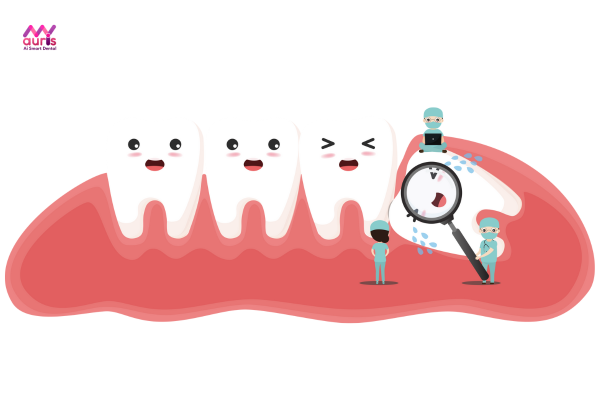When it comes to braces, almost everyone thinks of having to pull teeth. However, not everyone needs to have their teeth extracted when braces get the desired results. Whether or not a tooth should be extracted depends on the condition that the doctor prescribes and the appropriate treatment regimen. Therefore, to know if it is possible to get braces without tooth extraction, let’s find out with My Auris dentistry through the following article.
Why do I have to pull teeth when getting braces?
Even though tooth extraction is not a mandatory step in orthodontics, however, most people are advised to extract teeth when undergoing braces to improve orthodontic effectiveness.
Tooth extraction helps create space on the jaw, which helps the teeth move smoothly to the correct position on the jaw. Therefore, it is easy to adjust and arrange the teeth closely together, helping the teeth to be even and beautiful, the correlation between the two jaws is good, and the face is balanced and harmonious.

Not only that, tooth extraction also helps protect oral health, preventing situations where teeth are misaligned and damaged over time, especially for wisdom teeth.
Tooth extraction is not scary, nor is it dangerous or affects oral or neurological health if performed by a skilled, experienced, and professional doctor at a reputable, quality dentistry, ensuring full quality standards in terms of facilities, machinery, equipment, tools, and safe conditions. overlapping,…
Can braces not pull teeth?
Although tooth extraction creates favorable conditions for teeth to move, bringing high orthodontic efficiency, there are still many cases where tooth extraction is not necessary to achieve good results. Therefore, braces cannot completely remove teeth, everyone, but must follow the doctor’s instructions.
Normally, braces do not remove teeth in the following cases:
The jawbone is still developing
Braces do not Tooth extraction is most common in children, especially between the ages of 12-16 years old. Because at this time, the jaw bone is still soft and still developing, the tooth bone is not yet strong and complete, so it can be easily adjusted without needing to extract teeth.
And the results of braces are as expected, but also shorten treatment time as well as save money.m orthodontic costs more than adults.

Wide jaws
People with wide jaws Wide enough space for teeth to move in orthodontics without needing tooth extraction.
Sparse, gapped teeth
For people with sparse, gapped teeth, there is no need to extract teeth when getting braces. Because there is still enough space to help the teeth move conveniently, bringing the expected effect. After braces, the teeth are pulled closer together, even and balanced in the bite, providing high aesthetics, improved chewing and better oral health protection.
Can braces not remove wisdom teeth?
Wisdom teeth are the last teeth to grow on both the upper and lower jaw. Teeth grow from the age of 18-25, sometimes people grow their wisdom teeth later. Normally, adults will grow 4 wisdom teeth with 2 lower teeth and 2 upper teeth. However, some people grow all 4, some people only grow 1 or 2, some people only grow 2 lower jaws, or only 2 upper jaws.
Wisdom teeth are considered unnecessary teeth in the jaw because they do not provide aesthetics or chewing function. However, when talking about wisdom tooth extraction, many people feel stressed and worried. Therefore, there are quite a few customers who are interested in whether braces can prevent wisdom teeth extraction.
The fact that braces do not remove teeth depends on the growth condition of the teeth and whether or not the doctor prescribes extraction to ensure the results of the braces.

By the time wisdom teeth grow, the jawbone has fully developed and the teeth have stabilized, so there is not much space left. Therefore, most wisdom teeth that grow out face unfortunate situations. If wisdom teeth are in these situations, the doctor is required to extract them to ensure oral health and orthodontic results:
- Horizontal, misaligned wisdom teeth protruding into the cheek: this not only causes pain and discomfort, but horizontally penetrating the 7th molar will cause the teeth to be pushed forward, destroying tooth structure and affecting orthodontic results.
- Wisdom teeth get cavities: wisdom teeth are very susceptible to cavities because they are hidden inside and are difficult to clean. Furthermore, tooth number 7 usually grows not close to tooth number 7, creating conditions for food to be trapped, thereby causing plaque and bacteria to accumulate, causing oral diseases such as tooth decay, gingivitis, bad breath, etc. If this tooth is not extracted, it will cause pathogens to spread to the remaining teeth, affecting oral health and the results of braces.
- Wisdom teeth do not fully erupt: there are cases where wisdom teeth do not erupt as a whole tooth but only erupt a little. With this condition, the doctor also prescribes extraction to protect oral health and braces results.
- Wisdom tooth extraction creates space: even though wisdom teeth grow straight and do not cause dangerous complications, the doctor still prescribes tooth extraction to create space for the teeth to move easily. When removing wisdom teeth, there will be no need to extract teeth number 4 and 5, except in cases where the teeth are too complicated.
dental health as well as the results of braces:
Creates space to help teeth move easily
This is the first and most obvious benefit of braces. Wisdom teeth are molars with large chewing surfaces, taking up a lot of space on the jaw, so when extracted, there will be a significant amount of space for orthodontic treatment.
Furthermore, when braces are applied, the tension force from the wire or braces tray will have a great impact on the teeth. Because it causes the teeth to rotate in the right direction and position on the jaw. Therefore, the jaw needs to have enough space for teeth to move easily.
Prevent complications, protect oral health
Wisdom teeth are hidden deep in the jaw, making it difficult for toothbrushes to reach, making it difficult to clean and disinfect, thus easily leading to periodontitis, tooth decay, and gingivitis. Furthermore, misaligned, slanted, and impacted teeth pose many more dangerous risks to oral health such as wisdom tooth cysts, gingivitis, blood infections, etc., which are very difficult to treat.
Therefore, not only does it ensure the results of braces, but it also protects better oral health and prevents dangerous complications caused by wisdom teeth.
Protect the results of braces
Normal wisdom teeth will develop quite freely, not following a specific pattern, so they will grow crookedly, causing the jaw to push, causing the teeth to become increasingly misaligned. It even causes teeth to be wrongbite misalignment. Therefore, wisdom tooth extraction is considered a method of preventing misalignment after braces, helping to prevent negative effects on teeth and protecting the most optimal orthodontic results.

Hopefully with the shares in the article about braces without tooth extraction, people will better understand this condition. Accordingly, examine and check your oral health carefully and follow your doctor’s treatment regimen to achieve the best orthodontic results. Please contact My Auris Dental immediately for consultation support and to schedule an appointment as soon as possible.
Anh Thy





